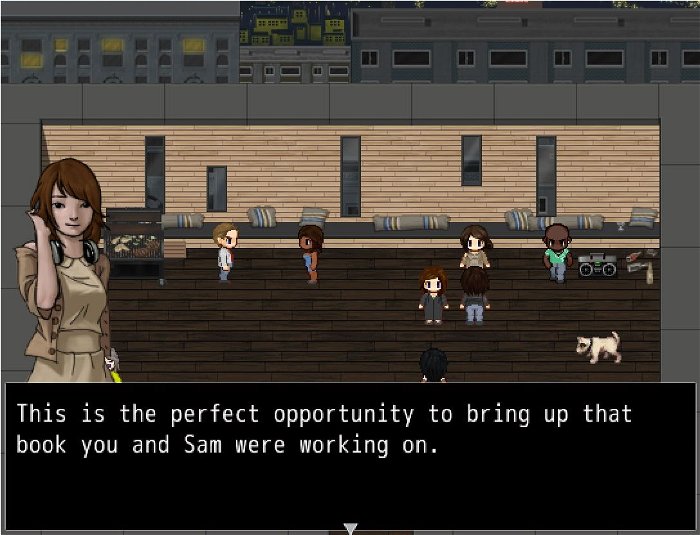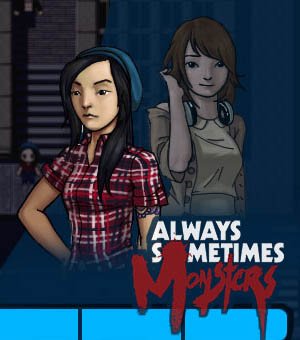The past few years have seen an increase in the number of videogames focused on telling real-life stories. From Cart Life and Papers, Please to The Novelist and Gone Home, many developers have sought to examine the drama inherent to the everyday lives of ordinary people, wringing pathos out of relatable—rather than fantastic—situations. Vagabond Dog’s Always Sometimes Monsters follows in these footsteps, its story tracing a single person’s attempt to make the best out of a difficult period of time in their life.
After a clever introduction that allows players to choose the hero of their story by toasting one of the guests attending a house party, Always Sometimes Monsters jumps ahead in time to the protagonist’s present day life. Regardless of who has been picked, the plot’s unseen period hasn’t been kind to the main character. S/he has broken up with their partner, is struggling to advance their career, and is financially destitute. From this point on, the game becomes a quest to simply figure life out. The protagonist needs to make money, decide whether passion or economic security is more important, and help friends through tough times (like paying for medical care or dealing with a troubled marriage). Always Sometimes Monsters is about exploring the nooks and crannies of cities, trying to make the best choices in situations where good decisions are often unclear, and finding a way to thrive on the margins of society. As my character—a young woman hoping to finish a book and nail down a publishing contract—pursued her dreams, she also had to hustle at day jobs to afford rent and be able to buy stamina-replenishing food and drinks. She was forced, at several points, to compromise her morals in order to earn a paycheque, making ecstasy runs for club kids, working as a union scab, and facilitating an old man’s gambling addiction.

Subject matter like this can be tricky to pull off, and for the most part, Always Sometimes Monsters does a good job. Topics like drug addiction and poverty are handled with a real sense of compassion and empathy. The weakest element of the game, though—the writing—is unfortunately its most prevalent. The characters’ dialogue varies greatly in quality, sometimes hitting the tone of realism that Vagabond Dog seems to be striving for and elsewhere coming off fairly clumsy. The humour that defines so much of the game’s tone is also hit-or-miss. While many of the game’s verbal puns are groan-worthy (a tackle shop called Master Baiter; the Sofa King Fast moving vans) Always Sometimes Monsters manages a few good laughs on the basis of its broader character and plot moments. Scenarios like one that see the main character assisting a very familiar-looking Mayor “Bob Hoard” in election rigging fare far better than the gags peppered throughout the game’s item descriptions and one-off conversations.
Regardless of its sometimes uneven writing, Always Sometimes Monsters’ overarching plot is told well enough that its other problems usually recede into the background. The protagonist’s journey—from sleeping in dreary alleyways to finding comfort on the couches of friends—is full of ups and downs. It subverts the expectations of its player throughout, refusing to offer easy answers to the sort of difficult moral dilemmas that colour everyday life. The pace remains brisk enough to maintain a good momentum for pretty much the entirety of the story as well (although the ending does drag on a bit longer than necessary). Rather than lose itself in naval-gazing contemplation, Always Sometimes Monsters prefers to explain the themes of its plot by engaging the player in dramatic beats that explore its premise. It would be easier to use internal monologues to wax philosophic on issues like labour exploitation and the nature of romantic love, but Vagabond Dog takes a more active approach, designing gameplay that illustrates these points in an interactive manner. A great soundtrack and colourful visual design go a long way toward helping tie the narrative together as well. The hand-drawn character portraits in particular do a great job compensating for the cartoonish blankness of the game’s simple sprites with detailed and relatable human faces.
Vagabond Dog has developed a title that, despite its rough edges, ends up offering an interesting look at a character coming to grips with themselves and their place in the world. Always Sometimes Monsters’ distinctive storytelling style may not always be executed quite as well as players would hope, but the final result is a worthwhile experience that remains absorbing throughout.





